Iconic Wall Street venues to host 2024 World Rapid & Blitz Championship
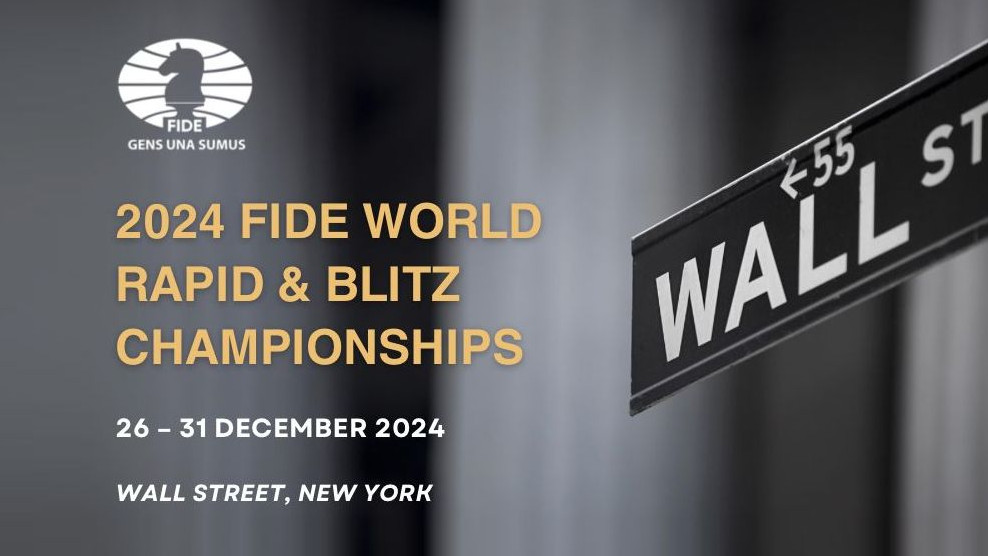
Both the Open and Women’s tournaments will be held in historic venues at the heart of New York’s financial district FIDE is pleased to announce the venues for both the Open and Women’s competitions of the 2024 World Rapid & Blitz Championship, which will take place from 26 to 31 December. For the first time, this prestigious event – one of the most prominent chess tournaments in the world – will be held in New York City. Photo: cipriani.com/ The Open tournament will take place at Cipriani Wall Street, a historic architectural landmark located in the heart of New York’s financial district. Built in 1841 in the Greek Revival style, the building has previously housed the New York Merchants’ Exchange, the New York Stock Exchange, the U.S. Customs House, and served as headquarters for the National City Bank. Today, Cipriani Wall Street is renowned as a grand and luxurious venue, and this will mark the first time it hosts a chess tournament of this scale. The Women’s tournament will be held right across the street at 48 Wall Street, another historic venue that once housed the Bank of New York & Trust Company Building and the Museum of American Finance. Photo: 48wallnyc.com/ Wall Street is synonymous with global financial power and is home to the New York Stock Exchange (NYSE), the world’s largest stock exchange. The area also hosts the headquarters of several Fortune 500 companies across industries like media, technology, and real estate. “The Championships will be held in world-class venues, which underlines the unique place chess occupies in the society. I see this event as a potential landmark moment for our game,” said Emil Sutovsky, CEO of FIDE. “We are thrilled to organize an event of this scale in the heart of global finance, and we believe shares of Chess are to rise globally as a result of it. FIDE is grateful to our partners and sponsors at Freedom Capital Markets for their support,” Sutovsky added. FIDE first announced in June that the World Rapid & Blitz Championship will take place in New York. In early September it was revealed that the event will feature a new two-stage format combining the Swiss System with knockout finals. For the first time, a rest day will be included, during which the Chess on the Wall Street Conference will explore the intersections of chess, finance, and business. Venues: – Open tournament: Cipriani Wall Street 55 Wall Street, between William & Hanover Streets, New York, NY 10005 – Women’s tournament: 48 Wall Street 48 Wall Street, New York, NY, 10005 More information about tickets, prize pools, and event details will be released soon.
Kakuma Refugee Team shines in 2024 Jumuiya Ya Afrika Mashariki Open
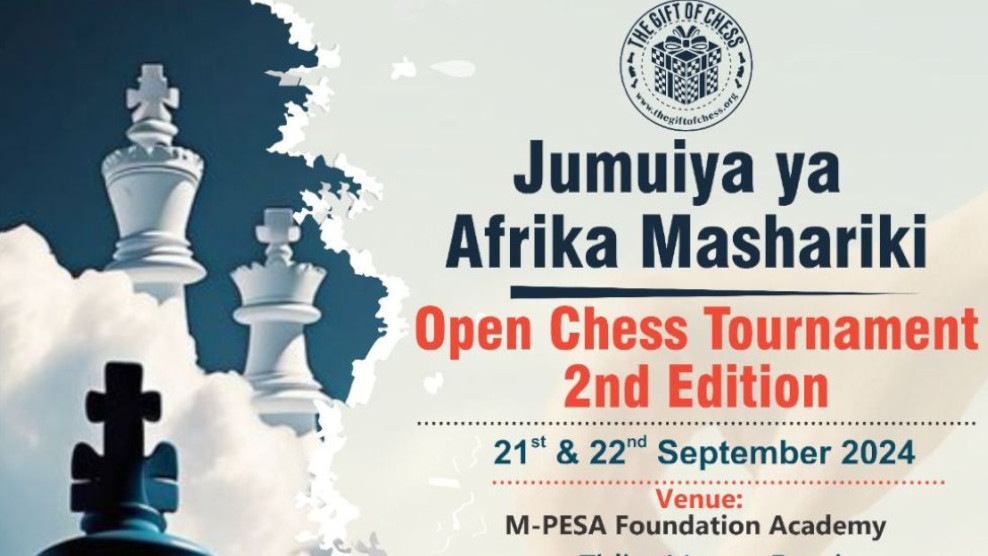
The 2024 Jumuiya Ya Afrika Mashariki Open Chess Tournament recently concluded at the M-PESA Foundation Academy, Kenya. This FIDE-rated tournament brought together over 440 chess enthusiasts from across Eastern Africa for a weekend of intense competition, camaraderie, and celebration of the game’s unifying power. The tournament featured three categories: U1400 & Under 12, U1700, and the Elite Section. Each category showcased a vibrant mix of young prodigies and seasoned veterans, all vying for glory on the 64 squares. Players in the U1400 & Under 12, and U1700 categories faced off in six rounds of 60-minute games, while those in the Elite Section battled through 90-minute classical time control games. Thom Ngong from South Sudan claimed the top spot, in the Elite Section, with his compatriot Mach Chol securing second place. FM Sergejs Klimakovs from Latvia was third. Chitundu Limbikani (left) versus M Sergejs Klimakovs of Latvia Achuoth Deng from Kakuma Refugee Chess Club emerged as the winner in the U1700 Section, followed by Bradly Wathimba from Makini School in second place. Ader Ajak, also representing Kakuma Refugee Chess, was third. Adrian Kariuki of Membly Titans took first place in the U1400 & Under 12 category. Shem Apamo and Nigel Njoroge, from Mavens Chess Club, came in second and third place, respectively. The event’s biggest highlight was a remarkable performance by the Kakuma Refugee Chess Team, competing under the banner ‘Chess for Protection.’ Their resilience and talent were on full display as they won the prestigious Best Club/School Award. Participants competed not only for the glory of victory but also for a range of coveted prizes. These included substantial cash awards, a one-year license to an exclusive chess database, and gleaming trophies and medals. The Gift of Chess organized the event with the unwavering support of key partners: FIDE, Chess Kenya, Opening Master, Afribot, Snapic Production, Confucius Institute, idChess, and Opic. Their invaluable support made this event a resounding success, and we are grateful for their contribution to the chess community. Phylis Mbaire Ngigi was the Tournament Director, with FA Karanja Amos as the Chief Arbiter and FA Kyalo Cynthia Wayua as his deputy, officiating the competition. Text and photos: Kenya Chess Masala
50th India Women’s Championship: P. V. Nandhidhaa wins maiden title
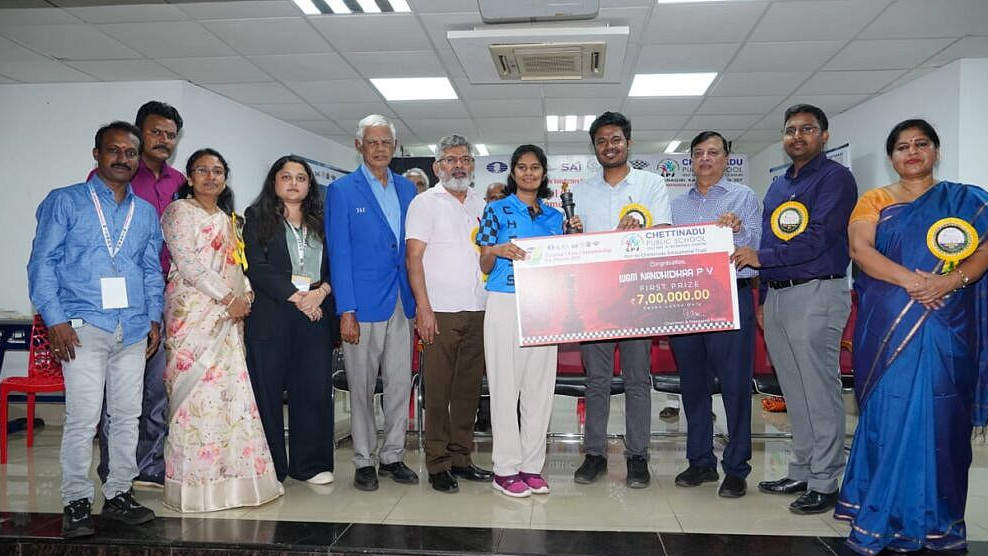
WGM P. V. Nandhidhaa of Tamil Nadu emerged as the winner of the 50th India National Women’s Chess Championship. The competition, an 11-round Swiss tournament, took place in Chettinadu Public School from October 3-13, 2024. The event brought together 150 best female India’s players from all across the country (except for the members of the golden Olympiad team) and saw a thrilling finale. The tournament was a tight race, with the top-rated players taking turns on the top of the standings. Going into the final 11th round, Nandhidhaa and J Saranya were jointly leading the field with 8/10, closely followed by a big group of players on 7.5/10. P. V. Nandhidhaa outplayed Priyanka Nutakki of Andhra Pradesh on the top board and clinched her maiden national title with an impressive score of 9 points as her main rival Saranya, J suffered a defeat at the hands of IM Rout Padmini. Three players tied for second place netting 8.5/10 with K Priyanka and Padmini Rout earning silver and bronze respectively, thanks to superior Buchholz. Final standings: 1 WGM Nandhidhaa, P V 2322 9 2 WIM Priyanka, K 2075 8½ 3 IM Padmini, Rout 2328 8½ 4 WGM Kiran, Manisha 2030 8½ 5 WFM Saranya, J 2048 8 6 WIM Chitlange, Sakshi 2188 8 7 WGM Gomes, Mary Ann 2298 8 8 WGM Varshini, V 2142 8 9 WGM Rakshitta, Ravi 2322 8 10 IM Kulkarni, Bhakti 2363 8 Complete standings The awarding ceremony was attended by IAS Ayush Venkat Vats, Sub-Collector of Devakottai, who praised India’s recent double medal-winning performance at the Chess Olympiad and expressed hope for the continued development of chess talents through such tournaments. Stephen Balasamy, General Secretary of TNSCA, S. P. Kumaresan, Chairman of Chettinadu Public School, and K. Arunkumar, Vice Chairman, were also present, with Kumaresan emphasizing that this tournament would remain a memorable event for the participants Photos: Deepti S Official website: https://aicf.in/
Nigel Short takes part in Turkmenistan’s chess festivities
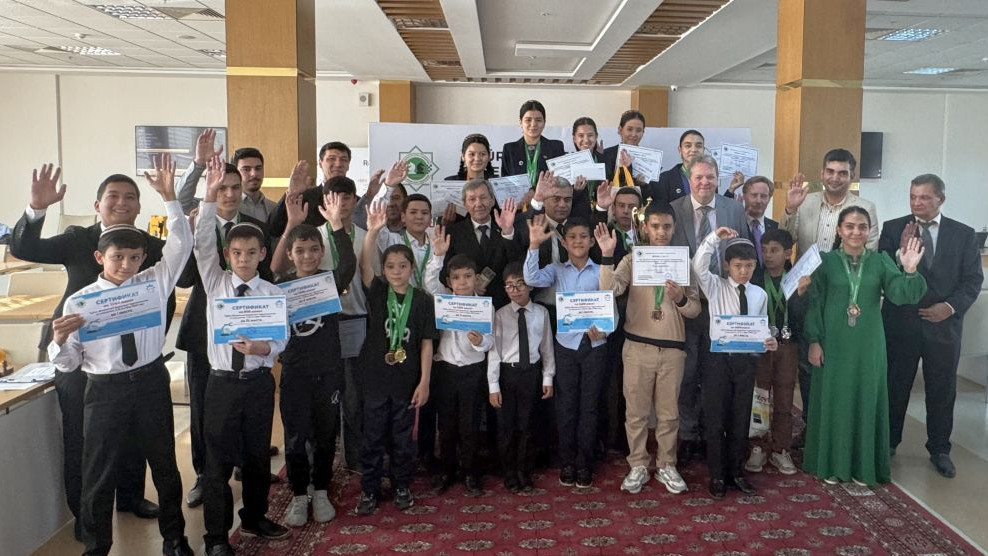
A chess legend, FIDE Director for Chess Development, Nigel Short, was the center of attention of Turkmenistan’s chess and sports community last week. The 59-year-old grandmaster from England, famous for challenging World Champion Garry Kasparov in a title match back in 1993, participated in a number of events in Ashgabat, the capital of Turkmenistan, during his visit to the country from October 9-12. The most memorable of them for the guest was the Federation Cup blitz tournament on October 10, which Nigel Short won, scoring 7.5 out of 9. GM Maksat Atabayev (FIDE blitz rating – 2377) Ashgabat and CM Amanmuhammet Khommadov (2316) tied for first position with the winner but took 2nd and 3rd places, respectively, on a tie-break. Atabayev drew his game against the 1993 world crown contender, while Hommadov notched up a memorable victory over the famous grandmaster but lost points in games with other opponents. The competition’s closing ceremony was attended by the British Ambassador to Turkmenistan, Stephen Conlon, who personally presented his fellow countryman with the well-deserved gold medal. Forty-five top finishers of the tournament in various categories, including standard, rapid and blitz, as well as in age categories, were also awarded cups, medals, certificates, cash prizes from the Turkmenistan Chess Federation, as well as presents and gift certificates from sponsors, including Regus, Intertek, Erem, ImdatBot and Ýigit. In total, more than 300 chess players took part in the Federation Cup tournament series. The distinguished foreign guests were also given gifts, namely the national Turkmen costume – don (gown) and telpek (fur hat). The British Ambassador and the English grandmaster also visited a small chess museum located in the Ashgabat Chess and Checkers School and observed the educational process in the elementary grades of the school. A giant chessboard in the school’s foyer aroused a particular interest among the distinguished guests. They used it to play a thematic game, which started with the English Opening. Nigel Short, FIDE Director for Chess Development, arrived in the Turkmen capital at the invitation of the British Embassy and the State Committee for Physical Culture and Sports to participate in an exhibition and conference dedicated to the development of sports in Turkmenistan. During his stay, he also gave a simultaneous exhibition to ten young players, which lasted more than two hours and ended with Nigel Short winning all the games. The youngsters gained valuable experience playing with the famous grandmaster and got a lot of positive emotions. At the request of the country’s coaches and leading chess players, GM Short held a separate meeting with them to discuss issues related to the development of chess players’ skills, coaching activities and creating an environment for the fast-paced and sustainable development of chess in the country. According to Mr Short, “the beauty of Ashgabat, the presence of a suitable chess infrastructure, as well as the talent and drive of young Turkmen chess players to develop and win make Turkmenistan ready to host international chess tournaments of the highest level.” “The successful performance of both national teams of Turkmenistan at the 45th World Chess Olympiad should give a new impetus and confidence to bring the level of play in Turkmenistan on par with such countries as Uzbekistan and Kazakhstan,” added the legendary grandmaster, who took part in seventeen Chess Olympiads over his illustrious career. Nigel Short is an English GM, widely regarded as one of the greatest British chess players ever. Born on June 1, 1965, in Leigh, Lancashire, he gained international fame in 1993 when he played a World Chess Championship match against Garry Kasparov, becoming the first Englishman to contend for the world title. Although he lost to Kasparov, participating in that match remains a milestone in chess history. Nigel Short has also been active as a chess commentator, coach, and administrator. Text and photos: Turkmenistan Chess Federation
Happy birthday, Nana Alexandria!
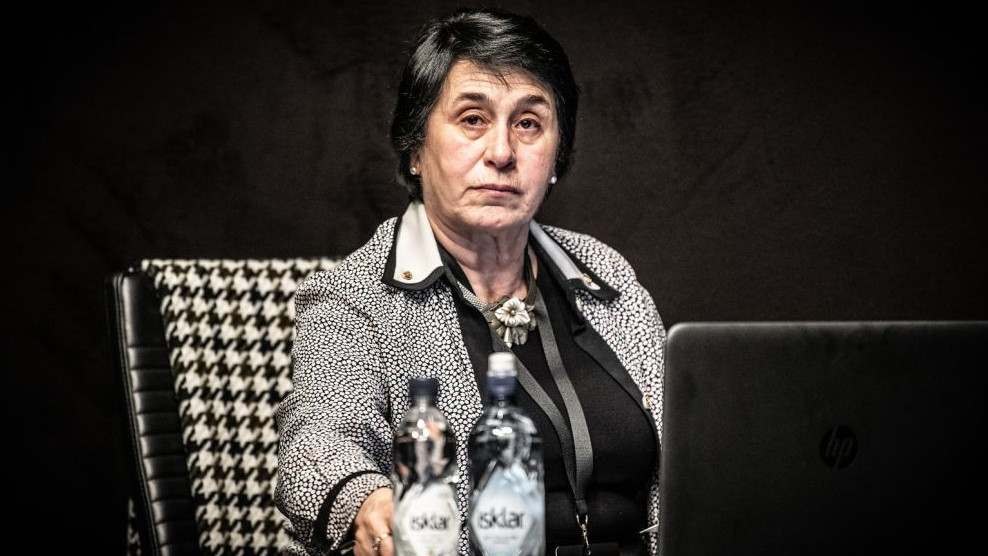
Two-time Women’s World Vice-Champion Nana Alexandria celebrates her 75th birthday. On this occasion, the winner of over twenty international tournaments, a talented journalist, and one of the most ardent advocates of women’s chess will receive the FIDE centennial award for her exceptional contribution to developing and popularizing women’s chess in the 20th century. Born in Poti, Georgia, Nana Alexandria learned chess at the age of four and six years later became the champion of Tbilisi among girls. Her progress in chess was nothing short of meteoric: by the age of 20, she won three USSR Women’s Championships titles (1966, 1967 and 1969) and established herself as a front-runner for the women’s champion crown. In 1973-1975, Nana went through all the stages of the World Championship cycle and challenged the reigning Women’s World Champion, Nona Gaprindashvili. Despite suffering a painful defeat in the 1975 Women’s World Championship match (+3 =1 −8), Alexandria managed to regroup and make all the way up again six years later. In 1981, she came much closer to the coveted title but drew the match with Maia Chiburdanidze (+4 =8 −4), with the champion retaining her title. As a member of the Soviet Union squad, Alexandria participated in six Chess Olympiads (1969, 1974, 1978, 1980, 1982 and 1986), making significant contributions to the team’s winning gold every time. Later she served as the captain of the gold-medal-winning Georgian Women’s Olympiad teams in 1992, 1994, and 1996. From 1986 to 2001, Alexandria held the esteemed position of chairperson of the FIDE Women’s Commission. As one of the longstanding leaders of women’s chess, Nana commands a great deal of respect in the chess world. After earning the title of International Arbiter in 1995, Alexandria officiated many prestigious competitions, including the 2018 Carlsen–Caruana World Championship match (as Deputy Chief Arbiter). We sincerely congratulate Nana Alexandria and wish her the finest in her professional and personal life. Photo: David Llada
Tech Mahindra Global Chess League: Triveni clinch second title in spectacular fashion

Season one champions, Triveni Continental Kings, triumphed over the PBG Alaskan Knights in both final matches to secure their second title in the Tech Mahindra Global Chess League. In two hard-fought, nerve-wracking matches, Triveni stunned PBG with a 13-7 victory as Black in the first match and followed it up with a 9-7 win as White in the second. This victory earned Triveni the championship and the top prize of 500,000 US dollars. Former Women’s World Champion Alexandra Kosteniuk emerged as the hero of the day. Her victory over Tan Zhongyi in the decisive game of the second match denied PBG a chance at tiebreaks. For her remarkable performance, she was named Player of the Match. “Amazing how chess can be so exciting,” said Alireza Firouzja, Triveni’s Icon player. “I am very happy and delighted to be part of this amazing event and show.” Firouzja also commented on the season’s innovation of no-time increments, a rule that added intensity to the matches: “As a player, I am happy to have played without increment for the first time, and I hope to see more of this.” It was a tough day for the PBG Alaskan Knights, who had been nearly unbeatable all season—until the finals. For their second-place finish, they took home 250,000 US dollars. How the day unfolded After nine days of play at the Tech Mahindra Global Chess League, two of six teams reached the finals: PBG Alaskan Knights and season one champions Triveni Continental Knights. The arena at London’s Friends House was full. In the true spirit of the GCL mission to open the game to a broader audience, spectators included young and old chess fans, even families with babies and toddlers, something not often seen at chess events. Also present were some of the players from the other teams who did not make it to the finals – a friendly gesture, respectful of the game and the colleagues. PBG had an amazing run this season, winning eight of the ten matches and securing a spot in the finals with a round to spare. For the defending champions, Triveni, the path to the finals was a bit bumpy: they lost four matches, and in the final round, they edged out a last-minute victory against Alpine Sg Pipers led by Magnus Carlsen in a death match for the remaining spot in the finals. The head-to-head score between the two gave PBG a heavy advantage on paper: they won both matches against Triveni with a dominating result – 15-3 (match one) and 12 – 8 (match two). Ahead of the finals, captains of both teams said their squads felt confident. But both needed to show that on the board, as there can only be one champion of the Global Chess League. PBG won the coin toss but decided to start as Black As per rules and GCL tradition, there was a coin toss before the rounds to determine which team would play as White. Despite the fact that playing as White gives more initiative to the team, it has been the case throughout this league that teams who won the coin toss often chose to play with the black pieces, postponing the use of the first-move advantage for the return match, just in case they need that extra edge in a must-win situation. This is exactly the case in the finals: PBG won the coin toss but opted to play the first match as Black. Just before the rounds started, the teams and the arbiters agreed on a small change in the order of games starting: during the event, the top two boards started first, then two minutes afterwards, the second two boards, and then another two minutes afterwards, the games started on the third set of the boards. Now, the order was reversed and the players on the top two boards started last, increasing the chances that they would finish last, deciding the match. While this provided greater excitement for the audience, it also put greater pressure on the top-players. Match One: Triveni defeats PBG 9-7 The first match kicked off with Anand Mahindra, Chairman of the Mahindra Group, making the ceremonial first move in the game between Alireza Firouzja and Anish Giri. As Mahindra was leaving the hall, he gave Firouzja a tap on the shoulder and a wave, possibly boosting Firouzja’s spirits. Whether it was Mahindra’s energy or sheer skill, Firouzja played aggressively, sacrificing an exchange but emerging a pawn up. Giri fought back, but Firouzja remained sharp despite being behind on the clock and ultimately secured a victory. The naturalized Frenchman was so absorbed in the game that, moments after his win, he eagerly asked his coach when the next match would begin. With a draw between Radjabov and Mamedyarov on board three, Triveni led 4-1. Shortly after, two more draws followed: one between Sindarov and Sarin on the prodigy board and another between Gunina and Kashlinskaya. Then came a turning point – in the battle between two former Women’s World Champions, Alexandra Kosteniuk defeated Tan Zhongyi. Refusing a draw earlier in the game, Kosteniuk’s bold decision paid off, sealing the match for Triveni before the final board had even finished. Although Nodirbek Abdusattorov won his game against Wei Yi on the prodigy board, it wasn’t enough to save PBG. Triveni claimed the first match with a final score of 9-7. As English Grandmaster and journalist Jon Speelman remarked in the press room, the day’s opening match had shown “excellent fighting chess,” setting the stage for an exciting remainder of the finals. Match Two: Wei Yi and Kosteniuk secure Triveni’s 13-7 victory In the rematch, the pressure weighed heavily on PBG, who needed a win to stay in contention. Playing as White, they were compelled to take more aggressive approaches, a risky strategy that could backfire if they overextended. Initially, things looked promising for PBG. The computer evaluations showed slight advantages for White or balanced positions across the boards. But that was just the beginning.
Global Chess League: Triveni reach finals after dramatic 9-7 victory over Sg Pipers
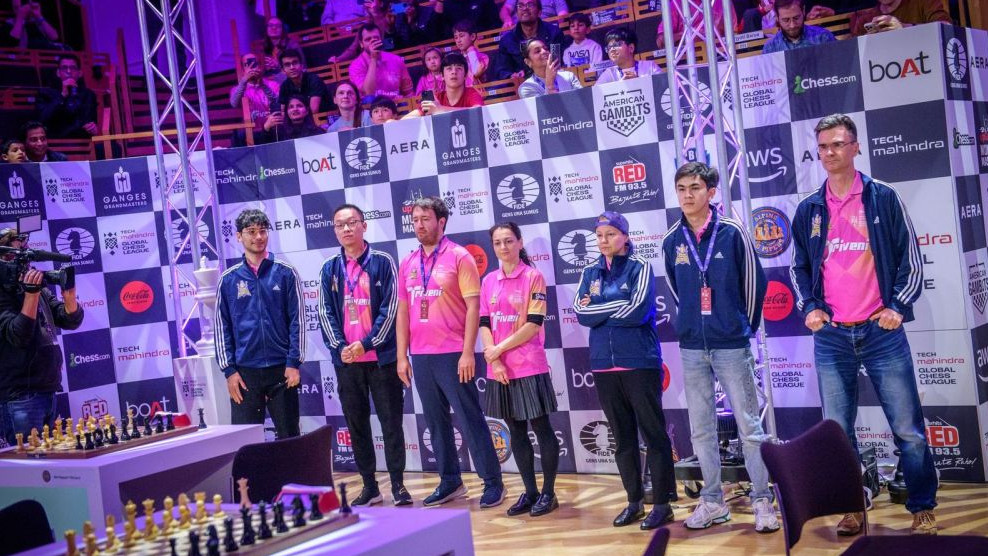
Season one winners Triveni Continental Kings secured a narrow 9-7 victory over Alpine Sg Pipers, clinching the last spot in the finals. They will face the PBG Alaskan Knights in the championship on Saturday. Friday marked the final day of matches at the Tech Mahindra Global Chess League, with two teams advancing to the finals. Despite three matches played, all eyes were on the decisive clash between second-placed Alpine Sg Pipers and Triveni Continental Kings, battling directly for the remaining spot in the finals. The Pipers entered with 18 match points and 81 game points, while Triveni had 15 match points but a higher game point tally of 90. A Triveni win would push them past the Pipers for the final spot. The match’s importance was clear from the start, with FIDE President Arkady Dvorkovich making the ceremonial first move on the icon board, where Triveni’s Alireza Firouzja faced Sg Pipers’ Magnus Carlsen. The Pipers started strong, securing solid positions on the top two boards, and soon after, Hou Yifan gained the upper hand against Alexandra Kosteniuk. A draw between Radjabov and Rapport on board three kept the tension high. At this point, Sg Pipers seemed on the verge of victory. However, as often happens in rapid chess, momentum shifted in minutes. Triveni’s Valentina Gunina delivered a crucial win against Kateryna Lagno. While Carlsen secured victory on the top board, giving Sg Pipers a temporary lead, Praggnanandhaa blundered in a winning position against Wei Yi, and Hou Yifan let her advantage slip away against Kosteniuk. With the score at 7-6 in favor of Sg Pipers, everything came down to the prodigy board, where Triveni’s Javokhir Sindarov was winning against Daniel Dardha. Despite severe time pressure on both sides, Sindarov held his nerve and secured the win, swinging the match for Triveni 9-7 and sending them to the finals, where they will defend their season one title. The other two matches of the day also brought excitement. The bottom two teams, upGrad Mumba Masters and Ganges Grandmasters, opened the day. Despite their strong squads, both teams struggled this season. Last season’s runners-up, Mumba, managed only three wins in nine matches, while Ganges secured just two. In their final match, Vishy Anand’s Ganges Grandmasters triumphed over Mumba with a commanding 12-4 score, avoiding a last-place finish. For upGrad Mumba Masters, it was a disappointing end to a season that began with high hopes. In the second match, PBG Alaskan Knights, already through to the finals, defeated the American Gambits 14-5. While the top two board games ended in draws, PBG scored with Black on three of the remaining four boards. Though this match had no impact on the standings—PBG was already qualified for the finals, and the Gambits couldn’t improve their fourth-place standing—the players gave their all. PBG’s victory, their eighth in ten matches, further boosted their confidence ahead of the finals. Despite the loss, the Gambits finished fourth, securing a prize. Here follows a closer look at the matches of day nine at the Tech Mahindra Global Chess League: upGrad Mumba Masters vs Ganges Grandmaster: Ganges avoid last-place finish Although neither team did well on the scoreboard, their matches were consistently exciting, and this one was no exception. Mumba, playing with the white pieces, had Maxime Vachier-Lagrave take on former World Champion Vishy Anand on the icon board. In a tense and complicated game that lasted 71 moves, the players battled until only the kings remained, agreeing to a draw. A similar result was registered on the superstar board. Mumba’s Arjun Erigaisi played aggressively against Vidit Gujrathi, who once again found himself in time trouble, as he had throughout the tournament. Despite the pressure, Erigaisi couldn’t break through, and the game ended in another draw. Two more draws followed—between Dronavalli Harika and Nurgyul Salimova, and on the prodigy board between Raunak Sadhwani and Volodar Murzin—leaving the score level. However, Ganges Grandmasters seized their chance. Vaishali Rameshbabu secured her first victory of the tournament, defeating Koneru Humpy, while Parham Maghsoodloo triumphed over Peter Svidler, both victories coming in time trouble. These key wins pushed the final score to 12-4 in Ganges’ favor. American Gambits vs PBG Alaskan Knights: PBG gambits finish on a high The second match of the day was between the American Gambits and PBG Alaskan Knights. On the icon board, Anish Giri and Hikaru Nakamura agreed to a draw in a balanced knight endgame. Meanwhile, on the superstar board, the Gambits’ Jan-Krzysztof Duda had the initiative but couldn’t achieve more than a draw against Nodirbek Abdusattorov. The story was different on the remaining four boards. PBG’s Shakhriyar Mamedyarov staged a dramatic comeback from a completely lost position against Yu Yangyi. Despite dropping his advantage twice, Mamedyarov somehow managed to secure the win. On the women’s board, Bibisara Assaubayeva defeated former Women’s World Champion Tan Zhongyi, keeping the Gambits’ hopes alive in the match. However, with Alina Kashlinskaya and Nihal Sarin pulling off wins on their boards, PBG sealed the match with a 14-5 victory. Though PBG didn’t need this win, it will certainly boost their confidence heading into the finals. With eight victories in ten matches, they are deserved finalists. Despite their defeat, the Gambits finished the tournament in fourth place, securing a prize. Alpine Sg Pipers v Triveni Continental Kings: A spectacular comeback for Triveni Sg Pipers, playing with the Black pieces, had a strong start to the match. On the icon board, Magnus Carlsen applied significant pressure on Alireza Firouzja. By the middlegame, Carlsen secured a strong advantage that only continued to grow. Meanwhile, on board two, Triveni’s superstar Wei Yi was also in trouble. Facing Praggnanandhaa with the white pieces, he defended well until move 21, when he blundered, directly entering a lost position. On board three, Triveni’s Teimour Radjabov held steady against Richard Rapport, with the two agreeing to a draw—the first game to finish. On board four, in a battle between two former Women’s World Champions, Sg Pipers’ Hou Yifan gained the upper hand against
4th FIDE IOCCP: A Journey of Triumph and Transformation
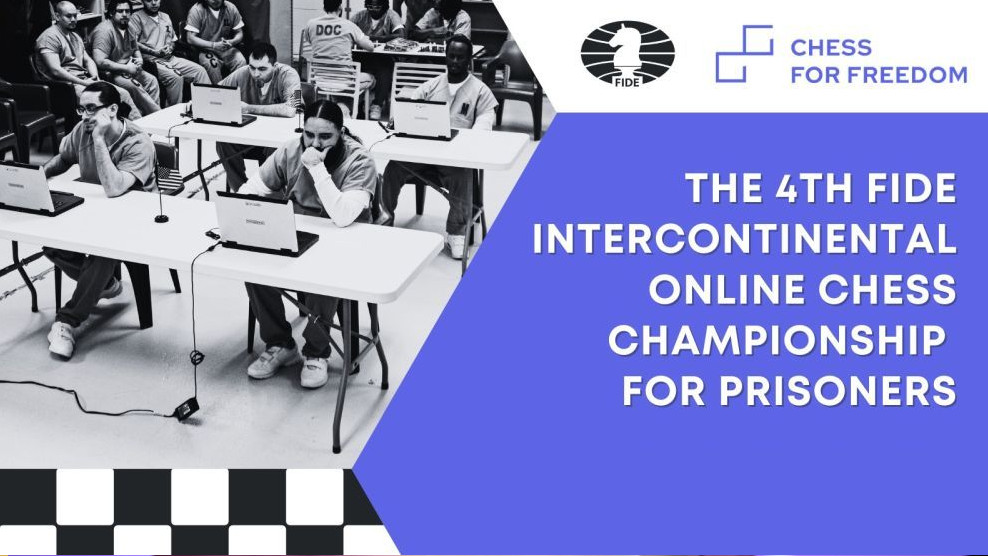
After several intense final matches, the 4th FIDE Intercontinental Online Chess Championship for Prisoners successfully concluded, crowning champions in the Open, Women, and Youth categories. The victors were the United Arab Emirates in the Open section, Mongolia in the Women’s section, and India 1 in the Youth section. Let’s take a closer look at the paths these winners took to secure their titles. OPEN SECTION On the first day of the tournament, the 115 teams were divided into groups according to their time zones, playing in a round-robin format in each section. The top two teams from each group advanced to the quarter-finals. With the Open Section featuring a total of 10 groups in the first stage, the quarter-final and semi-final stages were merged. The qualified teams were divided into two groups of ten, with the winners, the United Arab Emirates and El Salvador 1, advancing to the final. The runner-ups, India 1 and Serbia 1, competed for third place. Group 1 Group 2 In the battle for bronze, Serbia defeated India in a two-round match. Serbia secured a narrow 2.5-1.5 victory in the first round and followed it up with a commanding 3.5-0.5 win in the second. The final between El Salvador and the United Arab Emirates was packed with drama, ending in an Armageddon game. El Salvador won the first round with a sweeping 3.5-0.5 score, leaving them needing only a 2-2 draw to claim the title. However, the UAE responded strongly, winning the second round 2.5-1.5, pushing the match into a two-set play-off with a 3+2 time control. Once again, El Salvador took an early lead with a 3-1 score, but the UAE bounced back with a 2.5-1.5 win, forcing the contest into another blitz play-off. With the second phase of the blitz play-offs ending in a tie, the match culminated in an Armageddon game. Playing with the black pieces, the El Salvador player only needed a draw to secure the victory and held an advantage for most of the game. However, after some poor endgame decisions by El Salvador player, his UAE opponent seized the opportunity and scored a crucial victory securing the title for UAE. Open Finals Round 1 El Salvador 1 3.5-0.5 United Arab Emirates Open Finals Round 2 United Arab Emirates 2.5-1.5 El Salvador 1 Open Play-off Round 1 El Salvador 1 3-1 United Arab Emirates Open Play-off Round 2 United Arab Emirates 2.5-1.5 El Salvador 1 Armageddon United Arab Emirates 1-0 El Salvador 1 WOMEN SECTION In the Women’s section, eight teams advanced to the quarter-finals, where they played double-round matches. The results were as follows: Women Quarter-Finals Round 1 Mongolia 4-0 Latvia El Salvador 4-0 Mexico Romania 3-1 Georgia Serbia 2-2 India 1 Women Quarter-Finals Round 2 Latvia 0-4 Mongolia Mexico 1-3 El Salvador Georgia 0-4 Romania India 1 3.5-0.5 Serbia Apart from the first-round match-up of Serbia and India, the top 4 teams mostly dominated their matches and cruised to the semi-finals. The semi-finals saw the four dominant teams battling for spots in the final. El Salvador swept India 4-0 in the first round, followed by a 2-2 draw, sending them to the finals. Mongolia overcame Romania with a narrow 2.5-1.5 win in the first game, followed by another 2-2 draw to secure their spot in the final. Women Semi-Finals Round 1 El Salvador 4-0 India Romania 1.5-2.5 Mongolia Women Semi-Finals Round 2 India 2-2 El Salvador Mongolia 2-2 Romania In the finals, Mongolia and El Salvador were evenly matched, drawing the first round 2-2. However, Mongolia, the defending champions, dominated the second round with a 3-1 win to retain their title. Romania defeated India in a small final to claim bronze. Women Finals Round 1 Mongolia 1 2-2 El Salvador Women Finals Round 2 El Salvador 1-3 Mongolia YOUTH SECTION The Youth section, featuring players mostly aged 14-18, moved at a fast pace. Eight teams advanced to the quarter-finals, with both Indian teams, Serbia, and Ecuador making it through to the semi-finals. India 1 and India 3 faced off in a thrilling semi-final, with India 3 winning the first round 3-1. India 1 responded with a 3-1 win in the second round, leading to blitz play-offs, where India 1 dominated with scores of 3.5-0.5 and 4-0, advancing to the finals. The Serbia-Ecuador semi-final also came down to blitz play-offs. Ecuador narrowly won the first round 2.5-1.5, but Serbia fought back with a 3-1 win in the second round. After a 2-2 draw in the first blitz play-off, Ecuador crushed Serbia 4-0 in the second one to reach the finals. Youth Semi-Finals Round 1 India 1 1-3 India 3 Serbia 1.5-2.5 Ecuador Youth Semi-Finals Round 2 India 3 1-3 India 1 Ecuador 1-3 Serbia Youth Semi-Finals Play-off Round 1 India 1 3.5-0.5 India 3 Serbia 2-2 Ecuador Youth Semi-Finals Play-off Round 2 India 3 0-4 India 1 Ecuador 4-0 Serbia In the battle for third place, India 3 dominated Serbia, winning both rounds with a perfect score of 4-0. The final between India 1 and Ecuador started with a 2-2 draw in the first round, but India 1 turned in a commanding performance in the second round, clinching the title with a 3.5-0.5 victory. Youth Finals Round 1 India 1 2-2 Ecuador Youth Finals Round 2 Ecuador 0.5-3.5 India 1 The 4th FIDE Intercontinental Online Chess Championship for Prisoners showcased the transformative power of chess, bringing together players from across the globe in a thrilling display of skill, determination, and resilience. The event not only crowned champions from the United Arab Emirates, Mongolia, and India 1 in their respective categories but also highlighted the unifying spirit of the game, transcending borders and circumstances. One of the guests on the broadcast, Dainis Mikelsons, a former inmate and participant of the 3rd FIDE Intercontinental Online Chess Championship for Prisoners, shared an emotional and personal account when asked about his experience: “I love chess, and I have played it for all my life, and it has helped me during my life in
Global Chess League Day 8: PBG reach finals as Triveni and Pipers set for showdown
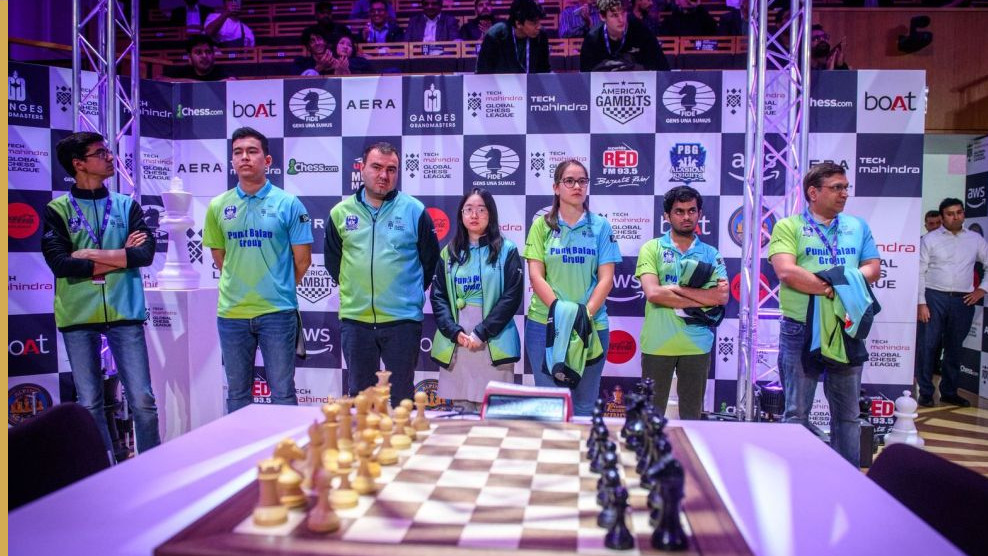
With 21 match points and 100 game points, PBG Alaskan Knights secured the top spot in the League, clinching a place in the finals. They defeated the defending champions, Triveni Continental Kings, who will now battle Sg Pipers for the second spot in the finals. It was a dramatic day at Friends House in London as teams fought in the penultimate round for a place in the finals. While much was undecided, three teams were already out of contention: upGrad Mumba Masters (last year’s runners-up), Ganges Grandmasters (third in season one), and American Gambits. In the opening match, the Gambits, led by world number two Hikaru Nakamura, defeated Mumba Masters 10-6. Although both teams were out of the running for the finals, this victory gave the Gambits a strong chance to win the League’s fourth-place prize. The first major match of the day saw Alpine Sg Pipers take on Ganges Grandmasters. The Pipers needed to win to edge closer to the finals. Richard Rapport defeated Parham Maghsoodloo, and Magnus Carlsen added another point with what he described as a “crazy game” against Vishy Anand. Off the board, some light drama unfolded when Kateryna Lagno asked Carlsen and Anand to quiet down during their post-game chat, prompting Carlsen to gesture “zipping” his mouth. Lagno then secured a win, followed by Hou Yifan, bringing the score to 13-1. Though Ganges’ Volodar Murzin won the final prodigy game, it was too late to change the outcome. The Pipers ended the day in second place with 18 match points, positioning them well for the finals. In the final match of the day, Triveni Continental Kings faced a difficult challenge against the tournament leaders, PBG Alaskan Knights. Despite being three match points ahead, PBG needed a win to confirm their finals spot, and they delivered. Anish Giri defeated Alireza Firouzja, while Nodirbek Abdusattorov outplayed Wei Yi. Teimour Radjabov won against Shakhriyar Mamedyarov to give Triveni some hope, but losses on the women’s boards sealed their fate. Despite Javokhir Sindarov’s win on the prodigy board, PBG won 12-8, ensuring their place in the finals. Triveni must now face Sg Pipers in a direct showdown for the remaining finals spot. Friday will be the last and decisive day as all teams play their final round before the top two move on to the finals. While PBG Alaskan Knights are already secure, all eyes will be on the clash between Triveni Continental Kings and Sg Pipers, where the winner will claim the second spot in the finals. Here follows a closer look at the games of day eight at the Tech Mahindra Global Chess League: American Gambits vs upGrad Mumba Masters: MVLs blunder helps Gambits win the match The first match of the day, between upGrad Mumba Masters and American Gambits, was more about pride than results. With no pressure on the outcome, Mumba—playing as White—started strong, with their players achieving favorable positions on four of the six boards. On the icon board, Maxime Vachier-Lagrave facing Hikaru Nakamura blundered heavily in a slightly inferior position, losing a piece and eventually the game. Despite this setback, the Mumba Masters had promising positions on other boards, but more trouble soon followed. On board two, Vidit was clearly better against Duda, but, as in previous matches, got into time trouble and lost his advantage. In a blitz finish, Duda capitalized, winning on time and pushing his team to an 8-0 lead. Peter Svidler drew with Wei Yi, scoring the first point for Mumba. Unfortunately for them, on both women’s boards, Humpy Koneru and Karika Dronavalli misplayed significantly better positions, leading to draws. Mumba’s only win came on the prodigy board. Jonas Bjerre from American Gambits launched an all-out attack against Raunak Sadhwani, even sacrificing an. However, at the critical point of the game, Bjerre miscalculated avoiding queen exchange instead of trading the most powerful pieces. As a result, all his pieces became trapped, leaving him completely lost. The final score was 11-6 in favor of the American Gambits, bringing them closer to fourth place and a prize. Alpine Sg Pipers vs Ganges Grandmasters: A dominating victory for the Pipers as Carlsen and Anand told off by Lagno The match provided excitement both on and off the board. The first to strike was Sg Pipers’ Richard Rapport, who completely dismantled Parham Maghsoodloo’s position for a commanding win. After the loss, Maghsoodloo appeared stunned, sitting motionless in his chair, staring aimlessly across the venue. Meanwhile, Indian compatriots Praggnanandhaa and Erigaisi drew their game, parting with smiles and laughter. But this match was no laughing matter for Sg Pipers, who needed to win. Ganges suffered another setback soon after when Vishy Anand lost to Magnus Carlsen in what the Norwegian described as “a crazy game,” where he was simultaneously pushing a pawn towards promotion and trying to checkmate Anand. With checkmate just one move away, Anand resigned. Carlsen’s victory earned him the Player of the Match award, along with a chess set presented by Stephen Lowe, Director of the British Chess Magazine—the world’s oldest chess journal. What followed was equally notable. As Anand and Carlsen casually discussed the game, while other matches were still ongoing, Magnus’ teammate Kateryna Lagno, playing against Nurgyul Salimova, turned to the former world champions and asked them to be quiet. Carlsen quickly raised his hand in apology and mimed zipping his mouth, while Anand, less affected, continued talking for a few more seconds. Both players eventually left the board to check other games before exiting the arena. By then, Sg Pipers were leading 7-1, with drama building on the remaining three boards. After silencing Carlsen and Anand, Lagno confidently finished her game, extending the Pipers’ lead to 10-1 and securing the match. Hou Yifan followed suit by defeating Vaishali, pushing the score to 13-1. The final game was on the prodigy board, where both sides traded advantages in time trouble. Ultimately, Ganges’ Volodar Murzin emerged victorious, claiming a consolation win for his team. With this decisive victory, Alpine
Shymkent welcomes second leg of FIDE WGP 2024-2025
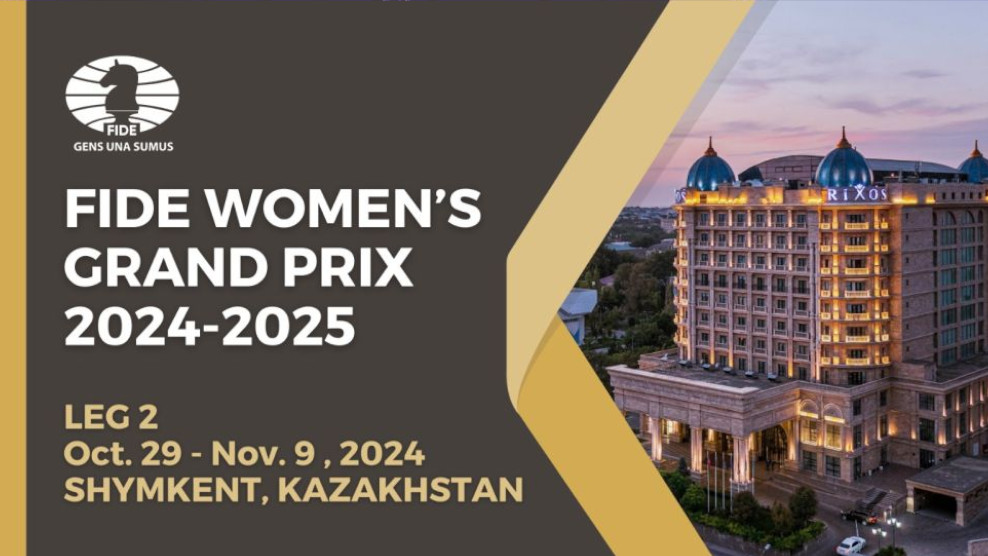
Mark your calendars as the second leg of the FIDE Women’s Grand Prix Series 2024-2025 is set to take place in Shymkent, Kazakhstan, from October 29 to November 9, 2024, with an exciting line-up of some of the strongest female chess players in the world who will face off in a 9-round round-robin tournament. From the 2024 FIDE Candidates winner Tan Zhongyi to the recent Olympiad gold medalist Divya Deshmukh, there is an excellent blend of rising talent and experienced grandmasters, with each player vying for valuable points and a chance to secure a place in the FIDE Women’s Candidates. The Shymkent leg of the Grand Prix series follows the successful first event in Tbilisi, Georgia, from August 14-25, 2024, which saw outstanding performances and thrilling games. Alina Kashlinskaya clinched first place, putting her at the top of the Grand Prix leaderboard with 130 points. Kazakhstan’s Bibisara Assaubayeva and Greece’s Stavroula Tsolakidou both had successful debuts in Tbilisi, both leading the tournament early on, ultimately ending second and third, respectively. They will be back for this second leg, joined by Aleksandra Goryachkina, Kateryna Lagno, Tan Zhongyi, Humpy Koneru, Elisabeth Paehtz, Nurgyul Salimova, Batkhuyag Munguntuul, and Divya Deshmukh. Players Bibisara Assaubayeva Bibisara Assaubayeva, born on February 26, 2004, is one of the brightest young talents in the world of chess. She has achieved significant milestones from a very young age and continues to impress with her skill and dedication. Assaubayeva has won multiple titles in different age categories, including the World Youth Chess Championships, establishing her as a top competitor on the youth circuit. In 2021, she made history by becoming the youngest-ever Women’s World Blitz Champion at the age of 17, a remarkable achievement in her burgeoning career. Photo: Michal Walusza She retained her title a year later, proving that her first victory was no accident. As she continues to develop her skills and gain experience, Bibisara Assaubayeva is poised to become an even more prominent figure in women’s chess. Bibisara’s participation in the second leg of the Women’s Grand Prix 2024–2025 series will provide her with further opportunities to compete against top-tier opponents and enhance her reputation on the global stage. Stavroula Tsolakidou Stavroula Tsolakidou, born on March 24, 2000, is one of the most promising young talents in the chess world and is the No. 1 ranked Greek female player. She has achieved significant milestones from a young age and continues to make her mark on the international stage. One of Tsolakidou’s significant achievements was her performance in the World Youth Chess Championships (U14, U16, U18), where she secured multiple titles, showcasing her talent and potential at a young age. Photo: Anna Shtourman Stavroula’s participation in the second leg of the Women’s Grand Prix 2024–2025 series will provide her with further opportunities to compete against top-tier opponents and make a name for herself among the global elite. Aleksandra Goryachkina Aleksandra Goryachkina, born on September 28, 1998, with a peak rating of 2611, is known for her positional and strategic mastery. Her deep understanding of chess fundamentals and ability to outmaneuver opponents in complex positions make her a formidable player. Photo: Michal Walusza A highlight of her career was winning the 2019 Women’s Candidates Tournament, which earned her the right to challenge Ju Wenjun for the Women’s World Chess Championship. Although she narrowly lost in the tie-breaks, her performance earned her widespread acclaim. Recently, she won the 2023 FIDE Women’s World Cup and continues to be a dominant force in the Women’s Grand Prix series. Kateryna Lagno Born on December 27, 1989, Kateryna Lagno, is celebrated for her dynamic and flexible chess style, with a peak rating of 2563. Achieving Grandmaster status at just 12 years and 4 months, she broke records and set new standards in women’s chess. Her career highlights include winning the European Women’s Championship twice and triumphs in the World Women’s Blitz Championship in 2010, 2018 and 2019. Photo: Michal Walusza Lagno’s consistent performance in the Women’s Grand Prix series, including winning the first leg of the 2022–23 series, showcases her versatility and strength. With a solid foundation in all phases of the game, she remains a formidable competitor in every tournament she enters. Tan Zhongyi Tan Zhongyi, born on May 29, 1991, is a former Women’s World Champion renowned for her solid and strategic playing style. Her deep opening preparation and exceptional endgame technique make her a challenging opponent. She won the Women’s World Chess Championship in 2017 after defeating Anna Muzychuk in the final. In 2024, she won the Cairns Cup, dominating a field of elite players. Photo: Michal Walusza She also won the Women’s Сandidates Tournament 2024, allowing her to compete against Ju Wenjun in the Women’s World Chess Championship 2025. Tan has a history of strong performances in the FIDE Women’s Grand Prix series, and with her current momentum, she is one of the favorites in the Grand Prix 2024-2025. Humpy Koneru Humpy Koneru, with a peak rating of 2623, is India’s highest-rated female player and a dominant force in women’s chess. Known for her tactical acumen and excellent positional understanding, Humpy has secured numerous titles, including the 2011 FIDE Grand Prix series and the 2019 Women’s World Rapid Chess Championship. Photo: Mark Livshitz After a brief hiatus, she returned triumphantly to win the Cairns Cup in 2020. Humpy’s consistent top-three finishes in the FIDE Women’s Grand Prix series demonstrate her world-class skills and relentless pursuit of victory. Elisabeth Paehtz Elisabeth Paehtz, born on January 8, 1985, is one of Germany’s most accomplished female chess players. She has had a distinguished career marked by numerous titles and significant contributions to the game. In November 2022, at the age of 37, FIDE confirmed the Grandmaster title for Paehtz, making her the first German woman to receive this title. In a time of chess prodigies on the rise, Paehtz serves as an inspiration that anything is possible at any age. Photo: Maria Emelianova Elisabeth consistently plays and performs with the women’s elite and participated in both the 2019-2021 and 2022–2023

